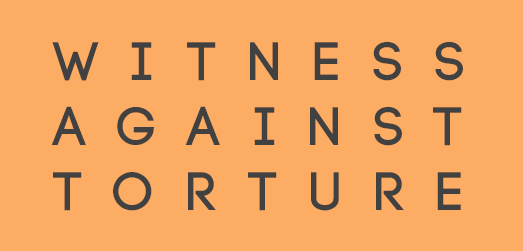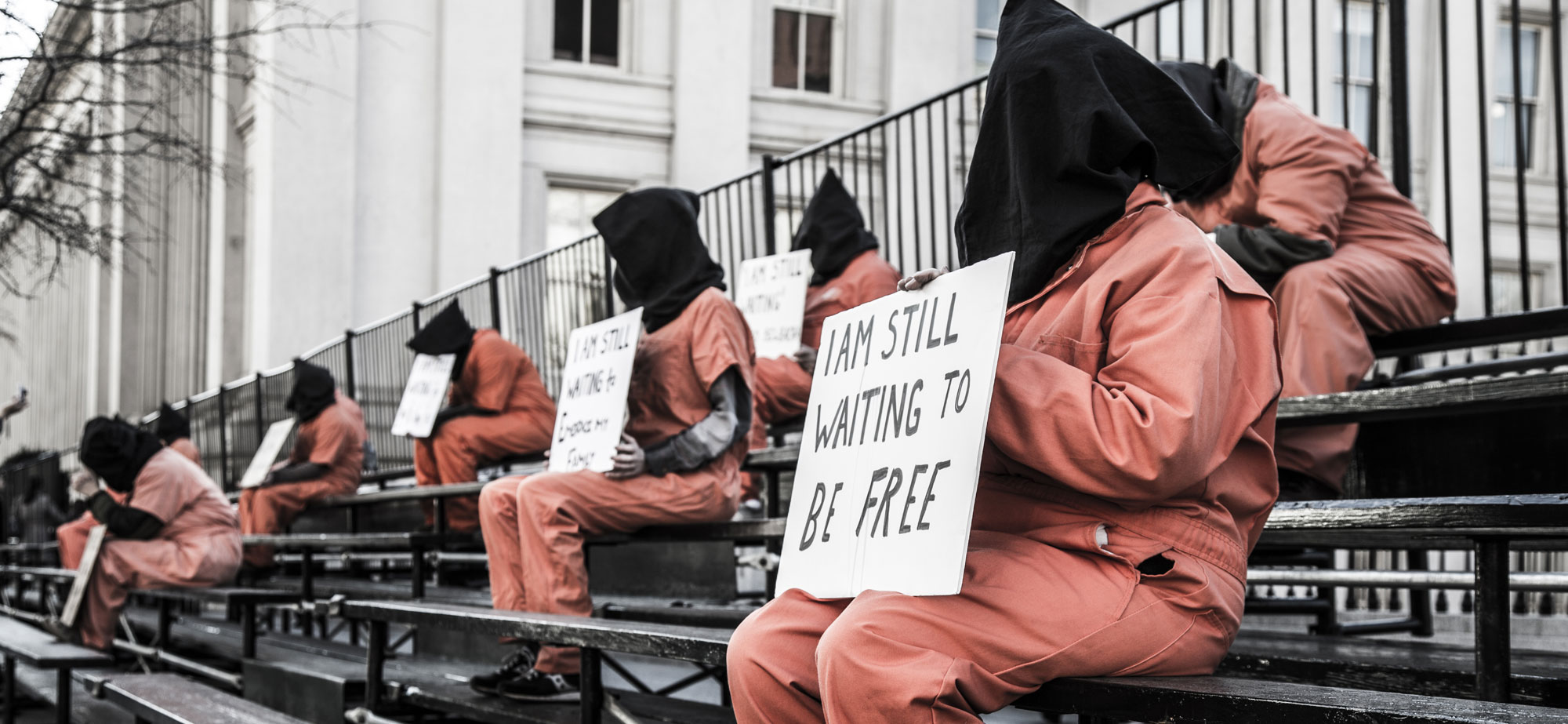From the Archive
Hunger Strike Solidarity Fast: Day 4
Guantánamo prisoner hunger strike day 49
As the definition of marriage has been debated by the Supreme Court in the last two days, many of us have been thinking of family, how we define family, and what our families mean to us. Below is a letter from Johina Aamer to UK Prime Minister Gordon Brown, testifying to how precious her family is to her. Johina’s father is Shaker Aamer, a British citizen held at Guantánamo, a victim of torture and extraordinary rendition. Also included in today’s update is a beautiful reflection from New York, written by Amy.
At the end of this email you will find links to some recent articles (Starving for Freedom is well worth watching!) and information about tonight’s conference call for fasters. There are over 100 people participating in the fast, and vigils have been held in Erie, PA, Washington DC, Chicago, NYC, Los Angeles, Northhampton, Toledo, and many other places. Click here for photos from Guantanamo Hunger Strike Emergency Response Vigils and send us photos and reports to share.
The hunger strike at Guantanamo officially includes 31 men, 11 who are being force fed, and 3 in the hospital. Attorneys insist that the number of participants is significantly higher. The crisis in and of Guantanamo goes well beyond any number of hunger strikers. It is good to be a part of a community trying to respond! While it may feel insufficient, our collective response is making a difference:
“One of our clients already suffers from other medical conditions that were worsening and now he has started vomiting blood. We’re at a loss for words when we write to them. It really helps to be able to tell them that others, through WAT and other organizations, are bringing awareness to their suffering. So, thank you.”
Peace.
Letter from Johina Aamer, Daughter of Shaker Aamer
January 11, 2010
Dear Gordon Brown,
I hope you are in good health. I am writing to ask you for my father’s release. As you might know, my father has been away for 8 years, he was taken away since I was four years old. It has been most of my life.
My brother Faris has never seen his father and misses him a lot. Sometimes he thinks other people are his father. Once a man came to do our garden, Faris (has) a lot of fun and laughs with him. When he left, Faris asked my Mum, “Is that my Dad?” He has never felt what it’s like to be with a father or to go out with him. Faris has had no experience at all of what it’s like to have a father just like every child does.
My mother is very patient but sometimes when she misses him too much she gets depressed. My mother is also a psychiatric patient. Whenever she gets depressed we have to go to my grandparents’ house where my grandparents look after her. When she is ill she is in bed day and night and can’t do much. I really hate it when she gets depressed.
At school, when it is time to go home, most of the children have their fathers pick them up which makes me miss him even more. I never really go[t] to do things with my father.
Also there is no reason for my father to be in prison. There have never been any charges made against him and he is innocent. My father has suffered for eight years in prison for no reason. I hope there can be a change now. He has got so many illnesses such as asthma and many physical problems. He is also the only British resident there.
I take that you understand this as a father and a husband. Nobody would like to be separated from their fathers or mothers. It is not nowhere near fun to be without a father we’ve missed so much.
I hope this letter can make a difference and that my father is released as soon as possible.
Thank you.
Resistance and Contemplation
Amy Nee Walker
Resistance and Contemplation is the name of a book by Jim Douglas which I have often heard mentioned but never read. Despite not having read it, I continue to carry this book with me or at least its title and every mention of it reignites a spark of contemplation, and perhaps a little resistance too. These words seem to be an incongruous juxtaposition. Resistance, in my mind, indicates action, tension, exposure. Contemplation, on the other hand, invokes a sense of calm, of quiet and of privacy. Yet, I have come to believe that a person who wants to practice either resistance or contemplation with wholeness must necessarily practice the other as well. Though they may seem to be in competition, these practices are vitally complimentary.
This week of fasting and vigils in response to the Hunger Strike at Guantanamo has offered a number of examples of how these two work together, each enhancing the other. Consider orchestration and participation in a vigil, or demonstration, as an act of resistance. Standing outside, holding a sign, I often feel restless, frustrated, futile. Giving my mind to contemplation of the men unable to bring their message to a public space, reflecting on their poignant poetry and letters, on what I know of their lives, I find the energy and focus to sustain my action. Only contemplating their lives, however, without actively responding, has a withering effect leading to anger at the injustice and despair at the broken laws and lives.
On the street, a contemplative stance reminds me to respond, rather than to react. It helps me to not be overwhelmed by the pulsating crowds and electric images that frenetically fill Times Square where we brought the presence of the jumpsuits and hoods on Palm Sunday, or the eclectic masses that move through Union Square where we have been gathering daily. It helped me to have curiosity, and even compassion for men who screamed and shouted with vitriol that we were “supporting terrorists” that “they should all die,” “let’s waterboard them,” “keep Guantanamo open forever,” that we “are all going to hell,” and of course the old standard, “F— you!” Where does this anger and hatred surface from? Does our presence spark latent fears? Create a sense of shame or embarrassment? Remind them of a deep sorrow, as with the man who shouted that his brother died in the bombing of the twin towers? These men (and it is always men, another point to contemplate) are as full of complexity and feeling as any of us. Just as we are careful to remove the confining label of “enemy” from the men at Guantanamo, so we must be careful not to simply move it over to those who resist our efforts. And that includes the individual in the furry blue Cookie Monster (yes, Cookie Monster!) costume walking our line slowly, intently, and making a throat cutting gesture. Instead of horror, or anger, I could only wonder – what in the world? Why? And laugh at the absurdity.
The loud voices, the hateful gestures, these have a way of seeming to dominate the scene. They certainly have a way of dominating the experience. Bringing contemplation to the present, as well as to memory, provides a space to recognize that among the many hundreds, perhaps thousands of people that we’ve encountered during our vigils this week, I could count the ones who rage on my fingers. Many more are those who listen, who receive, who walk on their way, and who engage in wholesome debate that puts us in the position of learning to listen and respond and clarify our thoughts. Such clarification, of course would not be present were I relying on contemplation alone. Contemplation leaves me mostly to myself, someone with whom I am considerably less likely to be challenged and expand, let alone learn to engage with and understand others.
Fasting itself bears the complex dynamics of resistance and contemplation. Resisting eating inevitably offers much food for thought. One thought I am continually carry with me this week is the new layer of anticipation and of meaning that this fast offers as I look forward to the Easter Vigil. The celebration that marks the end of Jesus’ days in the tomb also signals the end of our fast, bringing our bodies and spirits into alignment. Our bodies are filled with flavor and nutrition as our spirits are filled with the hope and joy of resurrection – of new life for all who suffer. And we too have the opportunity to be made new, digesting what we’ve experienced through fasting and vigiling. But for such transformation to abide, resistance and contemplation must continue; resisting the complacency that comfort brings, contemplating that while our hunger is sated, that of others continues.
Links for further reading
Starving For Freedom: 30 min HuffPost Live Video with Pardiss, Carol & others
Red Cross in Guantánamo a week early to check on hunger strikers
Striking Guantanamo Prisoners Say Water Denied
Guantanamo Detainees Make Hauntingly Beautiful Works Of Art
Guantanamo detainee sues Poland in European human rights court over alleged CIA black site
Erie Catholic community showing solidarity with hunger strikers
Photos from Guantanamo Hunger Strike Emergency Response Vigils
========
Fasters Conference Call – Thursday, March 28th @ 8pm EST
Conference dial-in number: (605) 477-2100
Participant access code: 185588#



Join us on social media